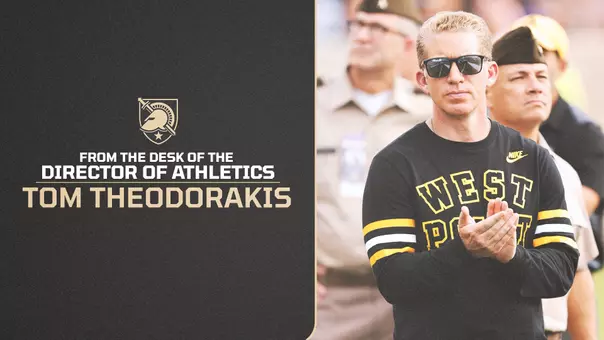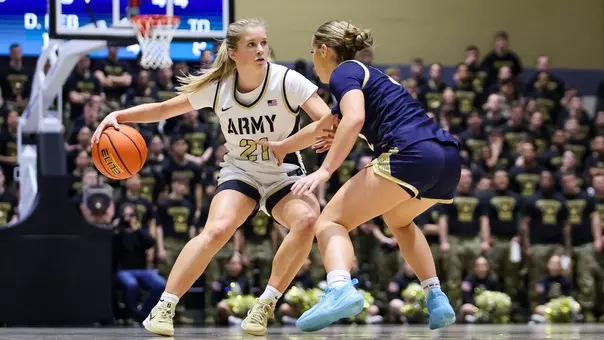Army West Point Athletics
MISSION FIRST: Making A Difference
November 08, 2016 | General, Women's Basketball
"The combination of academic rigor, military discipline and training and a demanding physical fitness training program allowed us to develop as leaders committed to the values of Duty, Honor and Country. West Point training coupled with participation in intercollegiate athletics, sets men and women on a course to make significant contributions and to make a difference in the world."
-- From Julie Del Giorno's remarks
Army Sports Hall of Fame induction, 2013
Julie Del Giorno was swallowing her medicine.
This was early on in her tenure at East Stroudsburg University, where she would serve as both the Assistant to the President and as the Interim Vice President for Student Affairs. The details of exactly what had gone wrong are lost to the mist of time, but this was the essence of the moment: Something had gone wrong. Something had gone overlooked, or had been handled improperly, or had gotten into the wrong set of hands. And now Julie Del Giorno's supervisor was going to take her to the woodshed and let her know exactly how profound the mistake had been.
"What I remember about that Dean," Del Giorno says with a laugh, "was that when you screwed up, she wanted to make sure you knew you had screwed up."
It was in this moment, a few weeks into this new job, that an old code returned to Del Giorno's consciousness, a simple saying from the earliest hours of "Beast Barracks," that seminal welcoming experience that all West Point Plebes endure. And how do any of them forget the three things that senior cadets always drilled into them from the start?
"Yes, Sir."
"No, Sir."
"No excuse, Sir."
That last one, especially.
The Dean was intimidating and she was blunt and she wanted to get a message across to her new subordinate, and if she'd had this meeting 300 times previously then all 300 had probably included the target of her ire pleading that there's only so much they could do, that all blame shouldn't be placed on one person's shoulders, that isn't fair …
… except this time, there would be a different answer.
"You're absolutely right," Del Giorno told her new boss. "My staff screwed up and I'm responsible for my staff, and so I'm responsible for this mistake. It won't happen again. And if it does happen again, then you and I will go see the President together. But I'm certain it won't happen again."
No excuse, Sir.
"It's funny," Del Giorno says, "how the things you learn at West Point always tend to find a way to help you every single day after you leave there."
All these years later, Julie Del Giorno still applies those lessons in her present job as the Director of Athletics Integrity and Investigative Services at Penn State University in State College, Pa. In that role she oversees development, implementation and oversight of compliance and athletics-integrity-program policies and practices within the university's athletic department that ensure compliance and ethical conduct.
Now, in many ways, the creation of that office – and the recruitment of Del Giorno to fill it – echoes one of the fabled quotes ever rooted in the lore of the U.S. Military Academy. It was, after all, Gen. George C. Marshall who, during World War II, is credited with saying, "I want an officer for a secret and dangerous mission. I want a West Point football player."
There was nothing at all secret about the challenge that awaited Del Giorno when she arrived in State College. Penn State had been a bastion of all that was right about college athletics for decades, and was felled by one of the most humiliating scandals in NCAA history. Its very essence, its core values, had all been called into question, and the need for self-evaluation and repair within its infrastructure was critical if it ever wanted to restore its place in that firmament.
If it wasn't a dangerous mission, it was absolutely an essential one.
And so the university turned to a West Point basketball player.
"When I was offered the job, I heard from plenty of friends and colleagues who asked, 'Why do you want to do that? Why do you want to go there?'" Del Giorno says. "They weren't discouraging me as much as making sure I knew what I was getting in to. But it's like I told the coaches here once I took the job: I came to Penn State because of my respect for the place. This is a place that demands both excellence in academics and excellence in athletics for all its student-athletes. And I wanted to be a part of that. It's such a good fit for me. They had integrity long before I got here. And there will be integrity here long after I'm gone."
She laughs.
"Really, that's the thing I always took from my experience at the Academy and in the Army," she says. "We are in the human-being business. Human beings are fallible, we use poor judgment, we make mistakes, and when we have a really big problem the question is: How do you address it? How do you fix it? How do you lead."
Those are issues that have been a part of Julie Del Giorno's life – and a part of every day of that life – since she was 18 years old.
"I believe that the lessons learned through participation in athletics serve to provide an individual with training and skills that may not be otherwise learned or experienced; things like the value of teamwork; persistence; dedication; hard work; putting the goal of the team over your own individual wants, needs and goals; the importance of accomplishing the mission as a team; and pushing yourself beyond the limits of what you believe you are capable of …"
Actually, she was 14 the first time she encountered West Point, because her sister, Deborah, had been appointed to the Class of 1982 and she would regularly visit – first from Rochester, N.Y., where both Del Giorno sisters were born, later from Florida, where the family moved when Julie was a freshman in high school.
"I became very interested in going there the moment I visited her the first time," Julie recalls. "I would go visit her and see it and take it all in. I was probably much more suited to it personally than she was, I was very interested in athletics and I really liked the structure and the discipline."
She was also a terrific basketball player, recruited by some Florida schools but ultimately committed to trying to compete at West Point, which by the time she arrived as a Plebe in the summer of '82 – just weeks after Deborah graduated – was playing a highly competitive Division II schedule.
And Del Giorno thrived on the hardwood.
"Joyful," she says, "is the best word to describe my time as an athlete there. I've taken complete joy in playing sports, especially basketball, since I was a kid and that was especially so at West Point.
"Playing with my teammates, and the stress release that I got going to practice. As a Plebe your head is spinning every day but there's always the two hours of practice where all you have to worry about is playing and running and shooting. As a senior you may have a paper due and an exam to study for, but at practice you can just focus on playing. It's funny: when I talk to student-athletes, sometimes they say they dread going to practice but I tell them, 'Just enjoy the chance to play. Enjoy your teammates.'"
Del Giorno enjoyed her basketball experience at West Point to the max. As a sophomore the team qualified for the NCAA Division II Tournament and won the first postseason game in the program's history, a 59-53 victory over Utica College played at the old Army Field House; they would be knocked out a round later, in the quarterfinals, by a powerful Valdosta State team, 92-65.
"I remember every small detail about that season," she says. "That stays with you forever."
Del Giorno made the most of her two remaining years of eligibility, too. As a junior in 1984-85 she averaged 14.9 points and 8.6 rebounds and earned second team All-America honors; as a senior she was even better, her averages of 18.3 points and 11.3 rebounds landing her a spot on the honorable mention All-American team. Her career total of 1,270 points is still good for ninth on Army's all-time scoring list.
She values her place in the West Point history books, especially since she is a prominent link from the program's successful past to the present run of dominance it has enjoyed as a Division I participant; West Point has made trips to the NCAA Tournament two of the last three seasons, and three times since 2006. Del Giorno especially enjoyed watching the exploits of the Academy's all-time leading scorer, 2016 graduate Kelsey Minato, who was a classmate and occasional roommate of Julie's niece, Natalie.
Army recognized Del Giorno's splendid career by inducting her into the Academy's Sports Hall of Fame in 2013; two years later, on Jan. 24, 2015, her No. 32 jersey was lifted to the rafters at Christl Arena, and she became one of the first three women's basketball players in Army history (along with Melody Smith and Katie Macfarlane) to have her number retired. It remains a humbling honor for her.
"Penn State's gymnastics team competed at Army last year, and one of the athletes saw the jersey and took a picture of it and sent it around," Del Giorno says, chuckling, before admitting: "That was kind of cool."
"Playing basketball at West Point served as a transformational opportunity for me and taught me leadership lessons that I still apply on a daily basis ..."
You don't have to tell anyone who spent four years at West Point that their college experience was a little different than most. Still, the student-athletes that Julie Del Giorno talks to every day all remind her of one important thing: everyone harbors the same desire to succeed, and must often confront the same impediments that would keep them from achieving what they want.
"Maybe we didn't have as many opportunities to break rules as they do," she laughs. "But sometimes we managed to, anyway. But it's taking ownership of those mistakes that will help you learn and grow from them. I think that's awfully important."
Of course, her time in the Army is a constant presence as well; she served tours both in the first Persian War and in Somalia and earned a Bronze Star before starting her career in intercollegiate athletics at her alma mater from 1993 to 1996, the last three years of her 10-year service.
"I was provided an opportunity that set the stage for the rest of my life," she says of her time in the Army. "Experience for leadership and real significant contributions that set the stage for the rest of my career. For me the soldiers I served with and the leaders I served with, the people that trained me, the soldiers I was able to train and lead, all of that made me a better person and better leader as I transitioned out of the Army and into higher ed.
"So many of those decisions really were life and death. You were responsible for the well-being of someone's life. I feel the same responsibility now for the student-athletes under my watch. It's the same privilege."
-- From Julie Del Giorno's remarks
Army Sports Hall of Fame induction, 2013
Julie Del Giorno was swallowing her medicine.
This was early on in her tenure at East Stroudsburg University, where she would serve as both the Assistant to the President and as the Interim Vice President for Student Affairs. The details of exactly what had gone wrong are lost to the mist of time, but this was the essence of the moment: Something had gone wrong. Something had gone overlooked, or had been handled improperly, or had gotten into the wrong set of hands. And now Julie Del Giorno's supervisor was going to take her to the woodshed and let her know exactly how profound the mistake had been.
"What I remember about that Dean," Del Giorno says with a laugh, "was that when you screwed up, she wanted to make sure you knew you had screwed up."
It was in this moment, a few weeks into this new job, that an old code returned to Del Giorno's consciousness, a simple saying from the earliest hours of "Beast Barracks," that seminal welcoming experience that all West Point Plebes endure. And how do any of them forget the three things that senior cadets always drilled into them from the start?
"Yes, Sir."
"No, Sir."
"No excuse, Sir."
That last one, especially.
The Dean was intimidating and she was blunt and she wanted to get a message across to her new subordinate, and if she'd had this meeting 300 times previously then all 300 had probably included the target of her ire pleading that there's only so much they could do, that all blame shouldn't be placed on one person's shoulders, that isn't fair …
… except this time, there would be a different answer.
"You're absolutely right," Del Giorno told her new boss. "My staff screwed up and I'm responsible for my staff, and so I'm responsible for this mistake. It won't happen again. And if it does happen again, then you and I will go see the President together. But I'm certain it won't happen again."
No excuse, Sir.
"It's funny," Del Giorno says, "how the things you learn at West Point always tend to find a way to help you every single day after you leave there."
All these years later, Julie Del Giorno still applies those lessons in her present job as the Director of Athletics Integrity and Investigative Services at Penn State University in State College, Pa. In that role she oversees development, implementation and oversight of compliance and athletics-integrity-program policies and practices within the university's athletic department that ensure compliance and ethical conduct.
Now, in many ways, the creation of that office – and the recruitment of Del Giorno to fill it – echoes one of the fabled quotes ever rooted in the lore of the U.S. Military Academy. It was, after all, Gen. George C. Marshall who, during World War II, is credited with saying, "I want an officer for a secret and dangerous mission. I want a West Point football player."
There was nothing at all secret about the challenge that awaited Del Giorno when she arrived in State College. Penn State had been a bastion of all that was right about college athletics for decades, and was felled by one of the most humiliating scandals in NCAA history. Its very essence, its core values, had all been called into question, and the need for self-evaluation and repair within its infrastructure was critical if it ever wanted to restore its place in that firmament.
If it wasn't a dangerous mission, it was absolutely an essential one.
And so the university turned to a West Point basketball player.
"When I was offered the job, I heard from plenty of friends and colleagues who asked, 'Why do you want to do that? Why do you want to go there?'" Del Giorno says. "They weren't discouraging me as much as making sure I knew what I was getting in to. But it's like I told the coaches here once I took the job: I came to Penn State because of my respect for the place. This is a place that demands both excellence in academics and excellence in athletics for all its student-athletes. And I wanted to be a part of that. It's such a good fit for me. They had integrity long before I got here. And there will be integrity here long after I'm gone."
She laughs.
"Really, that's the thing I always took from my experience at the Academy and in the Army," she says. "We are in the human-being business. Human beings are fallible, we use poor judgment, we make mistakes, and when we have a really big problem the question is: How do you address it? How do you fix it? How do you lead."
Those are issues that have been a part of Julie Del Giorno's life – and a part of every day of that life – since she was 18 years old.
"I believe that the lessons learned through participation in athletics serve to provide an individual with training and skills that may not be otherwise learned or experienced; things like the value of teamwork; persistence; dedication; hard work; putting the goal of the team over your own individual wants, needs and goals; the importance of accomplishing the mission as a team; and pushing yourself beyond the limits of what you believe you are capable of …"
Actually, she was 14 the first time she encountered West Point, because her sister, Deborah, had been appointed to the Class of 1982 and she would regularly visit – first from Rochester, N.Y., where both Del Giorno sisters were born, later from Florida, where the family moved when Julie was a freshman in high school.
"I became very interested in going there the moment I visited her the first time," Julie recalls. "I would go visit her and see it and take it all in. I was probably much more suited to it personally than she was, I was very interested in athletics and I really liked the structure and the discipline."
She was also a terrific basketball player, recruited by some Florida schools but ultimately committed to trying to compete at West Point, which by the time she arrived as a Plebe in the summer of '82 – just weeks after Deborah graduated – was playing a highly competitive Division II schedule.
And Del Giorno thrived on the hardwood.
"Joyful," she says, "is the best word to describe my time as an athlete there. I've taken complete joy in playing sports, especially basketball, since I was a kid and that was especially so at West Point.
"Playing with my teammates, and the stress release that I got going to practice. As a Plebe your head is spinning every day but there's always the two hours of practice where all you have to worry about is playing and running and shooting. As a senior you may have a paper due and an exam to study for, but at practice you can just focus on playing. It's funny: when I talk to student-athletes, sometimes they say they dread going to practice but I tell them, 'Just enjoy the chance to play. Enjoy your teammates.'"
Del Giorno enjoyed her basketball experience at West Point to the max. As a sophomore the team qualified for the NCAA Division II Tournament and won the first postseason game in the program's history, a 59-53 victory over Utica College played at the old Army Field House; they would be knocked out a round later, in the quarterfinals, by a powerful Valdosta State team, 92-65.
"I remember every small detail about that season," she says. "That stays with you forever."
Del Giorno made the most of her two remaining years of eligibility, too. As a junior in 1984-85 she averaged 14.9 points and 8.6 rebounds and earned second team All-America honors; as a senior she was even better, her averages of 18.3 points and 11.3 rebounds landing her a spot on the honorable mention All-American team. Her career total of 1,270 points is still good for ninth on Army's all-time scoring list.
She values her place in the West Point history books, especially since she is a prominent link from the program's successful past to the present run of dominance it has enjoyed as a Division I participant; West Point has made trips to the NCAA Tournament two of the last three seasons, and three times since 2006. Del Giorno especially enjoyed watching the exploits of the Academy's all-time leading scorer, 2016 graduate Kelsey Minato, who was a classmate and occasional roommate of Julie's niece, Natalie.
Army recognized Del Giorno's splendid career by inducting her into the Academy's Sports Hall of Fame in 2013; two years later, on Jan. 24, 2015, her No. 32 jersey was lifted to the rafters at Christl Arena, and she became one of the first three women's basketball players in Army history (along with Melody Smith and Katie Macfarlane) to have her number retired. It remains a humbling honor for her.
"Penn State's gymnastics team competed at Army last year, and one of the athletes saw the jersey and took a picture of it and sent it around," Del Giorno says, chuckling, before admitting: "That was kind of cool."
"Playing basketball at West Point served as a transformational opportunity for me and taught me leadership lessons that I still apply on a daily basis ..."
You don't have to tell anyone who spent four years at West Point that their college experience was a little different than most. Still, the student-athletes that Julie Del Giorno talks to every day all remind her of one important thing: everyone harbors the same desire to succeed, and must often confront the same impediments that would keep them from achieving what they want.
"Maybe we didn't have as many opportunities to break rules as they do," she laughs. "But sometimes we managed to, anyway. But it's taking ownership of those mistakes that will help you learn and grow from them. I think that's awfully important."
Of course, her time in the Army is a constant presence as well; she served tours both in the first Persian War and in Somalia and earned a Bronze Star before starting her career in intercollegiate athletics at her alma mater from 1993 to 1996, the last three years of her 10-year service.
"I was provided an opportunity that set the stage for the rest of my life," she says of her time in the Army. "Experience for leadership and real significant contributions that set the stage for the rest of my career. For me the soldiers I served with and the leaders I served with, the people that trained me, the soldiers I was able to train and lead, all of that made me a better person and better leader as I transitioned out of the Army and into higher ed.
"So many of those decisions really were life and death. You were responsible for the well-being of someone's life. I feel the same responsibility now for the student-athletes under my watch. It's the same privilege."
Players Mentioned
Army vs. Lafayette Women's Basketball Game Highlights
Saturday, February 28
Army vs. Holy Cross Men's Lacrosse Game Highlights
Saturday, February 28
Army vs. Florida State Women's Lacrosse Game Highlights
Sunday, February 22
Army vs. Michigan Men's Lacrosse Game Highlights
Sunday, February 22





